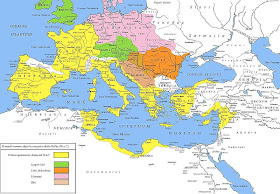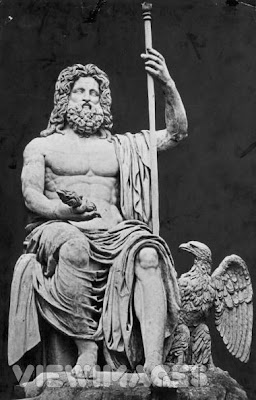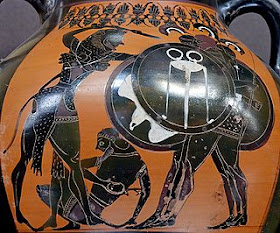HERCULES FAST ASLEEP
after-baccio-bandinelli-1550-sleeping-hercules
a)
Posteró dié simul atque é somnó excitátus est, Herculés fúrtum animadvertit et bovés ámissós omnibus locís quaerébat. Hós tamen núsquam reperíre poterat, nón modo quod locí nátúram ígnórábat, sed quod vestígiís falsís déceptus est. Tandem cum mágnam partem diéí frústrá cónsúmpsisset, cum reliquís bóbus prógredí cónstituit. At dum proficíscí parat, únus é bóbus quós sécum habuit múgíre coepit. Subitó ií quí in spéluncá inclúsí erant múgítum reddidérunt, et hóc modó Herculem certiórem fécérunt quó in locó célátí essent. Ille vehementer írátus ad spéluncam quam celerrimé sé contulit, ut praedam reciperet. At Cácus saxum ingéns ita déiécerat ut aditus spéluncae omnínó obstruerétur.
b)
Some words have been chosen for special consideration and are listed below. For the words not included in this list please refer to the WORDLIST in PAGES TOP RIGHT SIDE BAR.
postero die – ablative to indicate time when, ‘on the following day’.
e somno – ablative after the preposition e meaning literally ‘out of sleep’.
amissos – past participle of amitto, -ere, -misi, -missus, third conjugation verb meaning sent away or as here ‘lost’.
hos – plural accusative masculine of the pronoun hic, haec, hoc, referring to boves, meaning ‘these’.
omnibus locis – this is ablative of place without the preposition ‘in’ meaning literally ‘in all places’.
nusquam – nowhere, notice that in English we say ‘could not find anywhere’ but Latin prefers ‘could find nowhere’.
consumpsisset – pluperfect subjunctive after ‘cum’ when introducing a clause in the past, notice that the second ‘cum’ in this sentence is the preposition meaning ‘with’ and is followed by the ablative case ,reliquis, ‘the rest’.
dum profisci parat – literally ‘while he is preparing to set out’ but we have translated with a past tense; dum meaning ‘while’ is followed by the present tense in Latin.
unus e bobus – e followed by the ablative, ‘one out of the oxen’, ‘one of the oxen’. You might have expected the partitiive genitive here but with unus the ablative with ex or de is often used to express the idea of ‘one of a group’.
quos – relative pronoun ‘which’, masculine accusative plural as it is referring to the oxen.
ii – personal pronoun, masculine plural (see is ea id – GRAMMAR NOTES, top right sidebar) meaning ‘those’ or ‘the ones’.
certiorem fecerunt – third person plural perfect tense of certiorem facere ‘to inform, or to make more certain’.
quam celerimme – the superlative adverb with quam is used to express ‘as ... as possible’ so here it means ‘as fast as possible’.
se contulit – ‘he made his way’, third person singular of perfect tense of the verb se conferre, contuli, conlatus, meaning to betake oneself, make one's way.
ut praedam reciperet – ut introducing a purpose clause takes the subjunctive case, here the third person singular imperfect subjunctive of the verb recipio, -cipere, -cepi, -ceptus, take or get back, recover.
praedam – accusative singular of praeda, -ae, f., booty, spoil, plunder, referring to the oxen which had been stolen.
deiecerat – third person singular pluperfect of the verb deicio, -icere, -ieci, -iectus, to throw down.
ut ... obstrueretur – ut introducing a result clause, ‘so that it was blocked’, the verb is third person singular imperfect subjunctive passive of the verb obstruere meaning to block.
c)
Note: This section is not translated into idiomatic English but is intended, together with the notes, to give you the gist of the meaning; you can then come up with your own improved translation.
Postero die simul atque e somno excitatus est,
The following day as soon as he roused from sleep,
Hercules furtum animadvertit
Hercules noticed the theft
et boves amissos omnibus locis quaerebat.
and he looked for the lost cattle everywhere.
Hos tamen nusquam reperire poterat,
These however he could find nowhere,
non modo quod loci naturam ignorabat,
not only because the did not know the nature of the place,
sed quod vestigiis falsis deceptus est.
but because he was deceived by the false tracks.
Tandem cum magnam partem diei frustra consumpsisset,
At length when he had spent a large part of the day in vain,
cum reliquis bobus progredi constituit.
he decided to set out with the remaining cattle
At dum proficisci parat,
but while he was preparing to set out,
unus e bobus quos secum habuit mugire coepit.
one of the oxen which he had with him began to low.
Subito ii qui in spelunca inclusi erant
Immediately those which were shut up in the cave
mugitum reddiderunt,
returned the lowing,
et hoc modo Herculem certiorem fecerunt
and in this way they let Hercules know
quo in loco celati essent.
in which place they were hidden.
Ille vehementer iratus ad speluncam
He, very angry, towards the cave
quam celerrime se contulit,
made his way, as fast as possible
ut praedam reciperet.
in order to get back his plunder
At Cacus saxum ingens ita deiecerat
but Cacus had thown down a huge rock in such a way
ut aditus speluncae omnino obstrueretur.
that the entrance of the cave was completely blocked.
d) The following section is for you to copy and translate.
Postero die simul atque e somno excitatus est,
Hercules furtum animadvertit
et boves amissos omnibus locis quaerebat.
Hos tamen nusquam reperire poterat,
non modo quod loci naturam ignorabat,
sed quod vestigiis falsis deceptus est.
Tandem cum magnam partem diei frustra consumpsisset,
cum reliquis bobus progredi constituit.
At dum proficisci parat,
unus e bobus quos secum habuit mugire coepit.
Subito ii qui in spelunca inclusi erant
mugitum reddiderunt,
et hoc modo Herculem certiorem fecerunt
quo in loco celati essent.
Ille vehementer iratus
ad speluncam quam celerrime se contulit,
ut praedam reciperet.
At Cacus saxum ingens ita deiecerat
ut aditus speluncae omnino obstrueretur.





